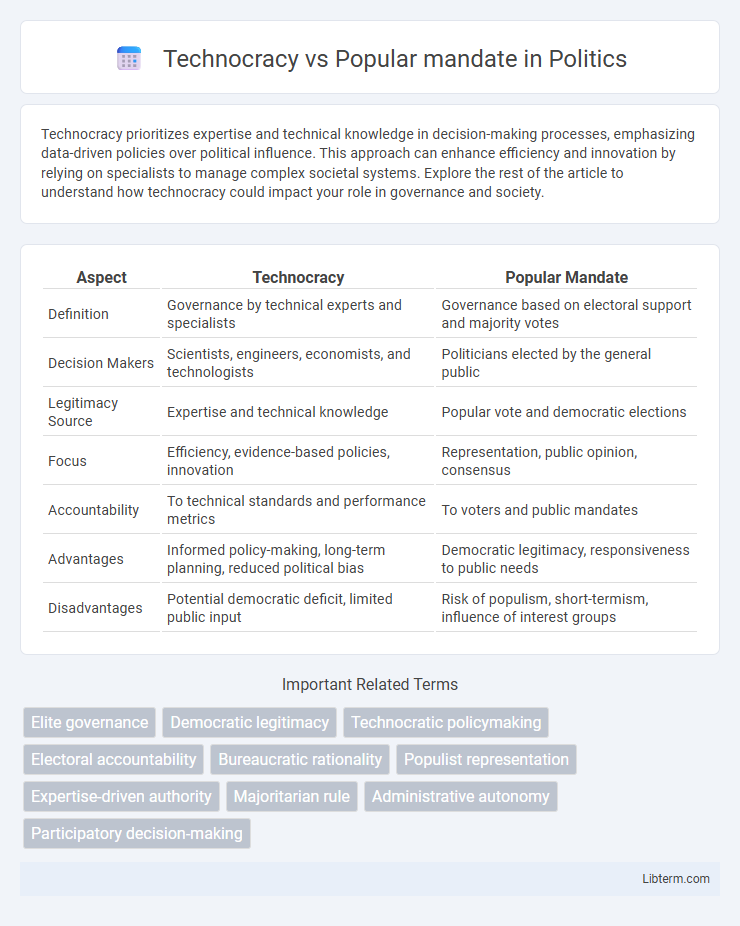Technocracy prioritizes expertise and technical knowledge in decision-making processes, emphasizing data-driven policies over political influence. This approach can enhance efficiency and innovation by relying on specialists to manage complex societal systems. Explore the rest of the article to understand how technocracy could impact your role in governance and society.
Table of Comparison
| Aspect | Technocracy | Popular Mandate |
|---|---|---|
| Definition | Governance by technical experts and specialists | Governance based on electoral support and majority votes |
| Decision Makers | Scientists, engineers, economists, and technologists | Politicians elected by the general public |
| Legitimacy Source | Expertise and technical knowledge | Popular vote and democratic elections |
| Focus | Efficiency, evidence-based policies, innovation | Representation, public opinion, consensus |
| Accountability | To technical standards and performance metrics | To voters and public mandates |
| Advantages | Informed policy-making, long-term planning, reduced political bias | Democratic legitimacy, responsiveness to public needs |
| Disadvantages | Potential democratic deficit, limited public input | Risk of populism, short-termism, influence of interest groups |
Understanding Technocracy: Definition and Principles
Technocracy is a system of governance where decision-making authority is vested in experts and specialists based on their technical knowledge and expertise, rather than elected representatives. It relies on principles of efficiency, data-driven policies, and scientific management to address complex societal issues. This approach contrasts with popular mandate systems, which prioritize democratic participation and electoral legitimacy over technical proficiency.
The Essence of Popular Mandate Explained
The essence of a popular mandate lies in its foundation on the collective will of the people, granting elected representatives the authority to govern based on majority consent. Unlike technocracy, which prioritizes expert knowledge and technical efficiency, a popular mandate emphasizes democratic legitimacy and accountability through frequent elections and public participation. This approach ensures that government policies reflect the preferences and values of the broader population rather than solely expert-driven decisions.
Historical Context: Technocracy vs Popular Mandate
The historical context of technocracy versus popular mandate reveals a recurring tension between expert-driven governance and democratic accountability. Technocracy emerged prominently during the early 20th century, particularly in the 1930s economic crises, emphasizing decisions made by scientific and technical experts to optimize societal outcomes. In contrast, popular mandate reflects the principle of power derived from electoral consent, reinforcing legitimacy through mass participation and representation in democratic systems.
Key Differences Between Technocracy and Popular Mandate
Technocracy relies on experts and specialists to make decisions based on technical knowledge and data-driven analysis, while popular mandate emphasizes decisions made through democratic voting and public opinion. In technocracy, governance is centralized within a skilled elite, contrasting with the decentralized, participatory approach that empowers the general population in a popular mandate system. The key difference lies in the source of authority: technocrats derive legitimacy from expertise, whereas popular mandate leaders gain authority from electoral support and majority consensus.
Advantages of Technocracy in Governance
Technocracy in governance leverages expertise and data-driven decision-making to enhance policy effectiveness and reduce corruption. Policies crafted by specialists ensure more precise solutions to complex economic and technological challenges, leading to sustainable development. This system promotes long-term planning and stability by prioritizing scientific knowledge over short-term political interests.
Strengths of a Popular Mandate System
A popular mandate system empowers citizens by ensuring decisions reflect the collective will through regular elections, enhancing democratic legitimacy and accountability. It fosters broader participation, giving diverse voices influence over policy direction and promoting political stability by aligning government actions with public preferences. This approach encourages transparency and responsiveness, strengthening trust between the electorate and elected officials.
Challenges and Criticisms of Technocratic Rule
Technocratic rule faces significant challenges including a lack of democratic legitimacy due to the absence of direct public participation in decision-making processes. Critics argue that technocrats often prioritize technical efficiency over social equity, leading to policies that may neglect broader societal needs and values. Furthermore, the complexity of governance can alienate citizens, reducing transparency and accountability in the political system.
Issues and Pitfalls of Popular Mandate Governance
Popular mandate governance often struggles with short-termism as elected officials prioritize immediate public approval over long-term policy effectiveness. Decision-making can be influenced by populist sentiments, leading to inconsistent or irrational policies that may undermine technical expertise and evidence-based approaches. Furthermore, the risk of majoritarian tyranny arises, where the rights and interests of minority groups are overlooked in favor of the majority's demands.
Real-World Examples: Technocracy and Popular Mandate in Action
Singapore exemplifies technocracy, where expert-led governance drives efficient policy implementation and economic development, focusing on meritocracy and data-driven decisions. In contrast, the United States reflects a popular mandate system, with elected representatives accountable to voters, emphasizing democratic participation and public opinion in shaping policies. These models highlight the balance between expert management and democratic legitimacy in real-world governance structures.
Future Prospects: Blending Technocracy with Popular Mandate
Future governance models increasingly explore hybrid systems combining technocracy's data-driven expertise with popular mandate's democratic legitimacy to enhance policy effectiveness and public trust. Integrating expert knowledge in decision-making processes ensures evidence-based solutions while maintaining accountability through electoral participation. This blend aims to address complex challenges by aligning technical proficiency with societal values, fostering adaptive and resilient governance structures.
Technocracy Infographic

 libterm.com
libterm.com